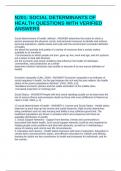N201: SOCIAL DETERMINANTS OF
HEALTH QUESTIONS WITH VERIFIED
ANSWERS
Social determinants of health, defined - ANSWER-determine the extent to which a
person possesses the physical, social, and personal resources to identify and achieve
personal aspirations, satisfy needs and cope with the environment (a broader definition
of health)
are about the quantity and quality of a variety of resources that a society makes
available to its members
Circumstances in which people are born, grow up, live, work and age, and the systems
put in place to deal with illnesses
are the economic and social conditions that influence the health of individuals,
communities, and jurisdictions as a whole
determine whether individuals stay healthy or become ill (a very narrow definition of
health)
Economic Inequality (CAN, 2005) - ANSWER-"Economic inequality is an indicator of
social inequities in health. As the gap between the rich and the poor widens, the health
status of the poorer populations declines" (CNA, 2005, p.3).
Neoliberal economic policies and the subtle elimination of the middle-class
Increased proportion of 'working poor'
Social Status - ANSWER-People with less social standing usually run at least twice the
risk of serious illness and premature death as those with more (Wilkinson & Marmot as
cited in CNA, 2005, p. 3)
12 social determinants of health - ANSWER-1. Income and Social Status - Health status
improves at each step up the income and social hierarchy. High income determines
living conditions such as safe housing and ability to buy sufficient good food. The
healthiest populations are those in societies which are prosperous and have an
equitable distribution of wealth.
2. Social Support Networks - Support from families, friends and communities is
associated with better health. Such social support networks could be very important in
helping people solve problems and deal with adversity, as well as in maintaining a
sense of mastery and control over life circumstances.
3. Education and Literacy - Health status improves with level of education. Education is
closely tied to socioeconomic status, and effective education for children and lifelong
learning for adults are key contributors to health and prosperity for individuals, and for
the country.
, 4. Employment and Working Conditions - Unemployment, underemployment, stressful
or unsafe work are associated with poorer health. People who have more control over
their work circumstances and fewer stress related demands of the job are healthier and
often live longer than those in more stressful or riskier work and activities.
5. Social Environments - the importance of social support also extends to the broader
community. Civic vitality refers to the strength of social networks within a community,
region, province or country
6. Physical Environments - the physical environment is an important determinant of
health. At certain levels of exposure, contaminants in our air, water, food and soil can
cause a variety of adverse health effects, including cancer, birth defects, respiratory
illness and gastrointestinal ailments.
7. Personal Health Practices and Coping Skills - Personal Health Practices and Coping
Skills refer to those act
The Ottawa Charter for Health Promotion: Prerequisites for Health (CNA, 2005, p. 6) -
ANSWER-Peace
Shelter
Education
Food,
Income
Stable eco-system
Sustainable resources
Social justice
Equity
Why Social Determinants of Health? - ANSWER-Relates to the functioning of the health
care system:
Heart disease and stroke are the leading causes of mortality in Canada (CNA, 2005).
These diseases account for 18% of hospital patient days
Diabetes type 2 has an increased prevalence and incidence rate and costs 13.2 billion
every year in Canada
At higher risk: Low-income Canadians and Aboriginal peoples (3 to 5 times higher risk)
of diabetes type 2 than the general Canadian populations in 2004 (Ling Yu & Raphael
as cited in CNA, 2005, p. 5)
How Does Income affect Health?
(CNA, 2005, p. 2) - ANSWER-"Low income causes material deprivation that removes
prerequisites for healthy development (shelter, food, warmth, and ability to participate in
society)
Low income causes psychosocial stress, which may affect people's health
Low income limits people's choices and works against desirable changes in behaviour"
(p. 2)




